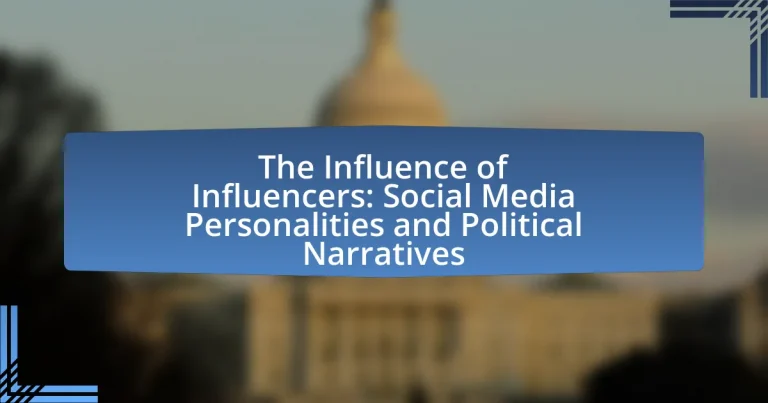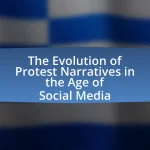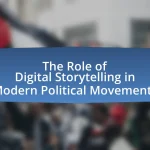The article examines the significant role of social media influencers in shaping political narratives and public opinion. It highlights how influencers leverage their large followings to disseminate political content, engage audiences, and mobilize civic participation, particularly among younger demographics. Key findings from research, including studies by the Pew Research Center, reveal that influencers can sway voter behavior, frame political issues, and contribute to the spread of misinformation. The article also discusses the ethical considerations for influencers, the implications of their narratives on polarization, and best practices for both influencers and audiences in navigating political discourse.
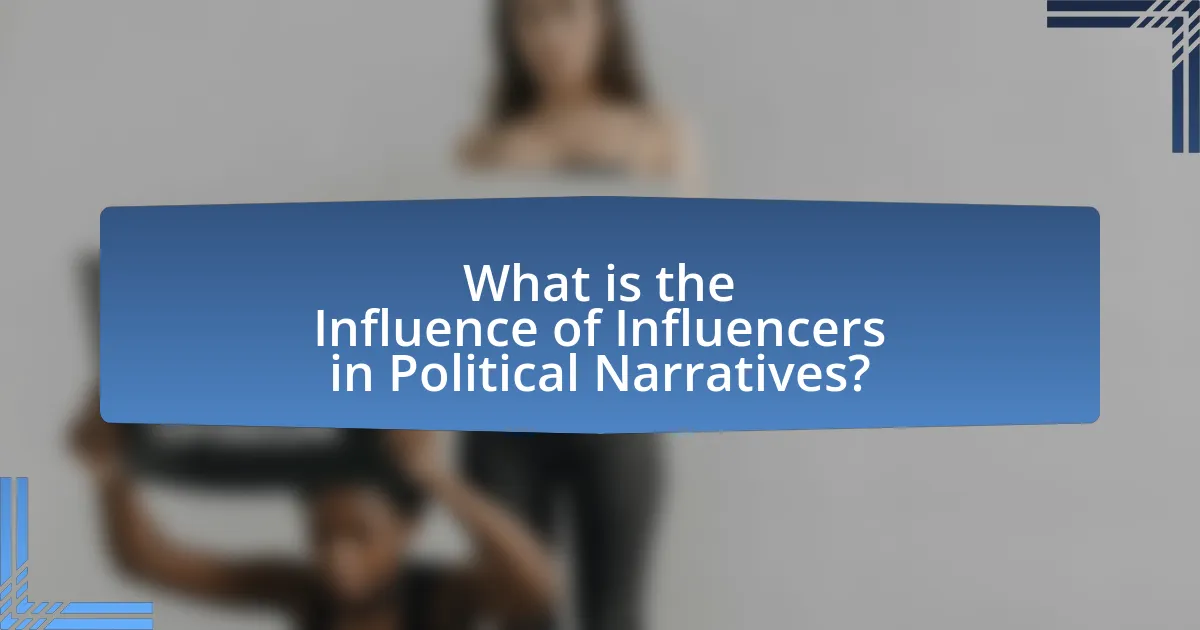
What is the Influence of Influencers in Political Narratives?
Influencers significantly shape political narratives by leveraging their large followings to disseminate information and opinions. Their ability to engage audiences through relatable content allows them to sway public perception and mobilize political action. For instance, a study by the Pew Research Center found that 55% of social media users have engaged with political content shared by influencers, indicating their substantial reach and impact. Additionally, influencers often frame political issues in ways that resonate with their followers, thus influencing the discourse surrounding those issues. This dynamic illustrates how influencers can act as intermediaries between political entities and the public, effectively altering the landscape of political communication.
How do social media personalities shape political discourse?
Social media personalities shape political discourse by leveraging their platforms to influence public opinion and mobilize followers around specific political issues. These individuals often possess large audiences, which allows them to disseminate information rapidly and create narratives that resonate with their followers. For instance, studies have shown that social media influencers can significantly impact voter behavior, as seen in the 2020 U.S. presidential election, where platforms like Instagram and TikTok played crucial roles in engaging younger voters. Additionally, research from the Pew Research Center indicates that 55% of social media users have engaged with political content, highlighting the effectiveness of influencers in shaping political conversations.
What role do influencers play in framing political issues?
Influencers play a significant role in framing political issues by shaping public perception and discourse through their platforms. They utilize social media to highlight specific topics, often prioritizing issues that resonate with their audience, which can lead to increased awareness and engagement. For instance, influencers have been instrumental in movements like Black Lives Matter and climate change advocacy, where their reach amplifies messages and mobilizes followers. Research indicates that influencers can sway opinions and behaviors, as seen in a study by the Pew Research Center, which found that 70% of young adults trust social media influencers more than traditional media sources. This trust enables influencers to effectively frame political narratives, influencing how issues are perceived and discussed in the public sphere.
How do influencers impact public opinion on political matters?
Influencers significantly impact public opinion on political matters by shaping narratives and mobilizing audiences through their platforms. They leverage their large followings to disseminate information, endorse candidates, and advocate for specific policies, often framing issues in ways that resonate with their audience’s values and beliefs. For instance, a study by the Pew Research Center found that 55% of social media users have engaged with political content, indicating that influencers play a crucial role in informing and swaying public perceptions. Additionally, influencers can create a sense of community and urgency around political issues, encouraging their followers to participate in civic activities such as voting or activism, thereby amplifying their influence on public opinion.
Why are influencers significant in modern politics?
Influencers are significant in modern politics because they shape public opinion and mobilize voter engagement through their extensive reach on social media platforms. Their ability to connect with large audiences allows them to disseminate political messages quickly and effectively, often reaching demographics that traditional media cannot. For instance, a study by the Pew Research Center found that 72% of teenagers use Instagram, making it a crucial platform for political discourse among younger voters. Additionally, influencers can humanize political issues, making them more relatable and accessible, which can lead to increased political participation.
What demographic trends are associated with influencer followings?
Demographic trends associated with influencer followings indicate that younger audiences, particularly those aged 18 to 34, are the most engaged with influencers on platforms like Instagram and TikTok. Research shows that 70% of teenagers trust influencers more than traditional celebrities, highlighting a shift in trust dynamics. Additionally, gender plays a significant role, with female influencers often attracting larger followings in beauty and lifestyle sectors, while male influencers dominate in gaming and technology. Furthermore, geographic trends reveal that urban populations are more likely to follow influencers compared to rural areas, reflecting differences in access to social media and digital content.
How do influencers engage with their audiences on political topics?
Influencers engage with their audiences on political topics primarily through social media platforms, where they share opinions, promote discussions, and mobilize followers around specific issues. They utilize various content formats, such as videos, live streams, and posts, to present their viewpoints and encourage audience interaction. For instance, a study by the Pew Research Center found that 70% of young adults follow influencers who discuss political issues, indicating a significant impact on political engagement among this demographic. Additionally, influencers often leverage storytelling and personal experiences to resonate emotionally with their audience, fostering a sense of community and shared values around political topics.
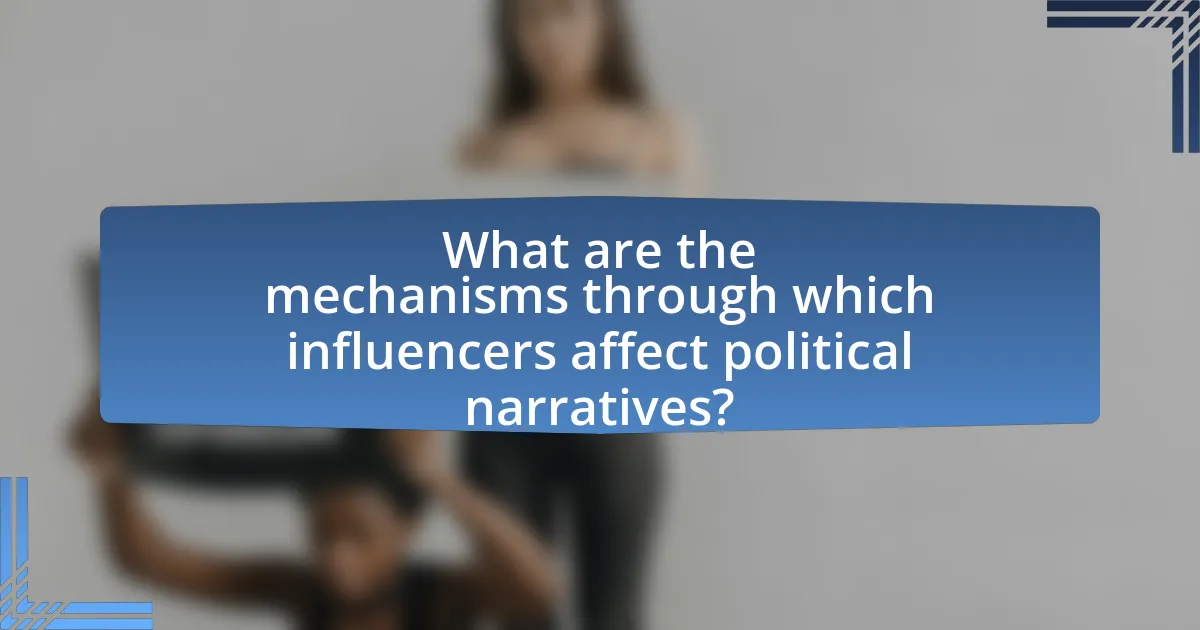
What are the mechanisms through which influencers affect political narratives?
Influencers affect political narratives primarily through social media engagement, shaping public opinion, and mobilizing followers. They leverage their platforms to disseminate information, often framing political issues in ways that resonate with their audience. For instance, influencers can amplify specific political messages or ideologies, thereby influencing the perceptions and beliefs of their followers. Research indicates that influencers can sway political attitudes significantly; a study by the Pew Research Center found that 70% of young adults trust social media influencers more than traditional politicians. Additionally, influencers often create a sense of community among their followers, fostering discussions that can lead to collective political action, such as voting or activism. This combination of reach, trust, and community engagement solidifies their role in shaping political narratives.
How do influencers utilize social media platforms for political engagement?
Influencers utilize social media platforms for political engagement by leveraging their large followings to disseminate political messages, mobilize audiences, and encourage civic participation. They create content that resonates with their audience, often using storytelling, visuals, and personal experiences to make political issues relatable. For instance, during the 2020 U.S. presidential election, influencers like Chrissy Teigen and Dwayne “The Rock” Johnson used their platforms to advocate for voter registration and participation, significantly impacting young voter turnout. Research indicates that social media influencers can effectively shape public opinion and increase political awareness, as evidenced by a study published in the Journal of Communication, which found that influencer endorsements can lead to higher engagement rates and increased likelihood of political action among followers.
What strategies do influencers employ to communicate political messages?
Influencers employ several strategies to communicate political messages, including storytelling, visual content, and audience engagement. Storytelling allows influencers to frame political issues in relatable narratives, making complex topics more accessible. Visual content, such as infographics and videos, captures attention and conveys messages quickly, which is crucial in the fast-paced social media environment. Additionally, influencers engage their audiences through interactive polls, Q&A sessions, and live discussions, fostering a sense of community and encouraging dialogue around political topics. These strategies are effective as they leverage the influencers’ established trust and rapport with their followers, enhancing the likelihood of message retention and action.
How does the algorithm of social media platforms amplify influencer messages?
The algorithm of social media platforms amplifies influencer messages by prioritizing content that generates high engagement, such as likes, shares, and comments. This engagement-driven approach ensures that posts from influencers, who often have established followings, are more likely to appear in users’ feeds. For instance, platforms like Instagram and TikTok utilize machine learning algorithms that analyze user behavior to promote content that aligns with individual interests, thereby increasing the visibility of influencer messages. Research indicates that posts with higher engagement rates can reach a significantly larger audience, often exponentially, compared to those with lower interaction levels. This mechanism effectively enhances the reach and impact of influencer communications within the social media landscape.
What types of political content do influencers typically share?
Influencers typically share political content that includes advocacy for specific policies, commentary on current events, and personal opinions on political issues. This content often aims to engage their audience in political discourse, raise awareness about social justice issues, and mobilize followers for activism. For instance, a study by the Pew Research Center found that 70% of young adults follow influencers who discuss political topics, indicating a significant impact on political engagement among their followers.
How do influencers balance personal branding with political advocacy?
Influencers balance personal branding with political advocacy by strategically aligning their values with their audience’s interests while maintaining authenticity. They often select political issues that resonate with their brand identity, ensuring that their advocacy feels genuine to their followers. For instance, influencers like Emma Watson and Leonardo DiCaprio have successfully integrated environmental advocacy into their personal brands, which enhances their credibility and strengthens their connection with audiences who share similar values. This approach allows influencers to engage in political discourse without alienating their followers, as they present their advocacy as an extension of their personal brand rather than a separate agenda.
What are the ethical considerations for influencers discussing politics?
Influencers discussing politics must consider the ethical implications of their influence on public opinion and behavior. They have a responsibility to provide accurate information, as misinformation can lead to significant societal consequences, such as the erosion of trust in democratic processes. Additionally, influencers should disclose any potential conflicts of interest, such as sponsorships or affiliations with political entities, to maintain transparency with their audience. Ethical considerations also include the potential for manipulation of followers’ beliefs and the impact of their messaging on vulnerable populations. Research indicates that social media can amplify polarizing views, making it crucial for influencers to approach political discussions with care and a commitment to fostering informed dialogue.
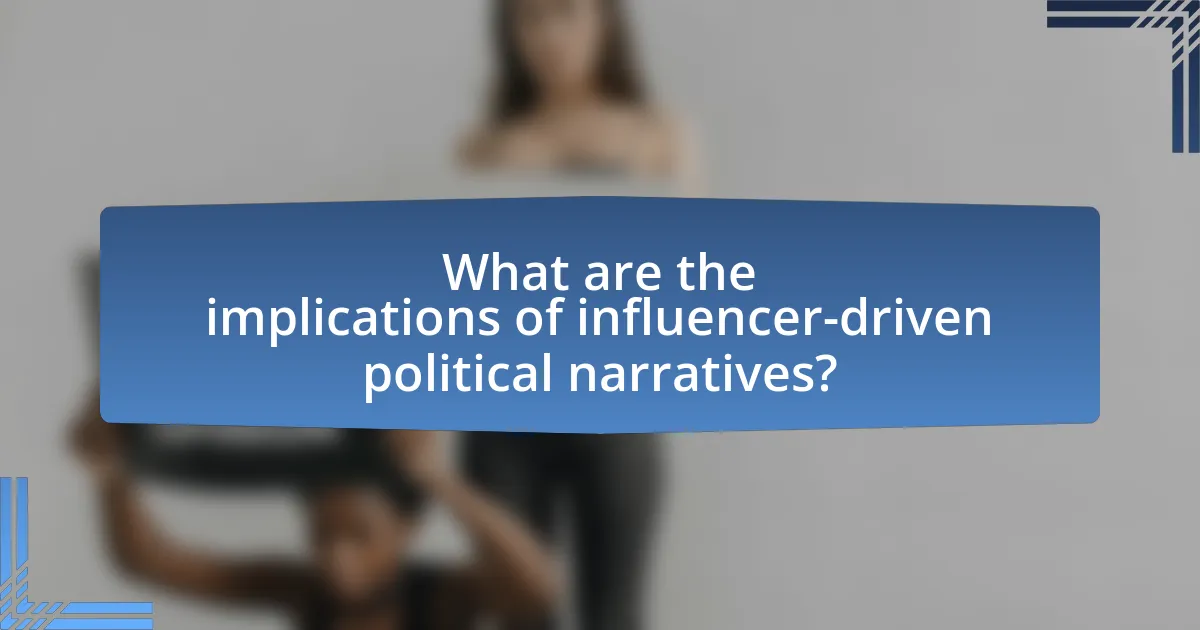
What are the implications of influencer-driven political narratives?
Influencer-driven political narratives significantly shape public opinion and political engagement. These narratives can amplify specific viewpoints, often leading to polarization among audiences. For instance, a study by the Pew Research Center in 2020 found that social media influencers can sway the political beliefs of their followers, particularly younger demographics, by framing issues in a relatable manner. This influence can result in increased voter mobilization or, conversely, apathy, depending on the narrative presented. Furthermore, influencers often bypass traditional media gatekeepers, allowing for the rapid spread of misinformation, which can distort public understanding of political issues.
How do influencers contribute to polarization in political views?
Influencers contribute to polarization in political views by amplifying partisan narratives and fostering echo chambers. Their large followings allow them to disseminate content that aligns with specific political ideologies, often reinforcing existing beliefs among their audience. Research indicates that social media algorithms prioritize content that generates engagement, which often includes emotionally charged political posts, further entrenching divisive viewpoints. A study by the Pew Research Center found that 64% of Americans believe social media has a mostly negative effect on the way things are going in the country, highlighting the role of influencers in shaping public perception and increasing polarization.
What evidence exists linking influencer activity to voter behavior?
Evidence linking influencer activity to voter behavior includes studies showing that social media influencers can significantly impact political engagement and voting intentions. For instance, a study by the Pew Research Center found that 55% of young voters reported being influenced by social media content when deciding how to vote. Additionally, research published in the Journal of Communication demonstrated that influencers who endorse candidates can sway their followers’ opinions, with 30% of respondents indicating they were more likely to support a candidate after seeing them promoted by an influencer. These findings illustrate a clear connection between influencer activity and voter behavior, particularly among younger demographics.
How do influencers affect the spread of misinformation in politics?
Influencers significantly contribute to the spread of misinformation in politics by leveraging their large followings to disseminate unverified claims and biased narratives. Their credibility and perceived authority can lead audiences to accept false information as truth, often without critical scrutiny. For instance, a study published in the journal “Nature” found that misinformation spreads six times faster than factual information on social media platforms, largely due to influential figures sharing misleading content. This phenomenon is exacerbated by algorithms that prioritize engagement, further amplifying the reach of such misinformation.
What can be learned from the influence of influencers on political narratives?
The influence of influencers on political narratives reveals that they significantly shape public opinion and discourse. Influencers leverage their platforms to disseminate information, often framing political issues in ways that resonate with their followers. For instance, during the 2020 U.S. presidential election, influencers mobilized younger voters through targeted messaging on platforms like Instagram and TikTok, leading to increased voter turnout among this demographic. Research by the Pew Research Center indicates that 55% of young voters reported being influenced by social media personalities in their political views. This demonstrates that influencers can effectively alter political narratives by engaging audiences in relatable and accessible ways.
What best practices should influencers follow when discussing political issues?
Influencers should prioritize transparency and accuracy when discussing political issues. This involves clearly disclosing any affiliations, sponsorships, or biases that may influence their perspectives. For instance, a study by the Pew Research Center found that 64% of social media users believe that influencers should disclose their political affiliations to maintain credibility. Additionally, influencers should fact-check their statements and rely on reputable sources to avoid spreading misinformation, as misinformation can significantly impact public opinion and voter behavior. Engaging with diverse viewpoints and fostering respectful dialogue can also enhance their discussions, promoting a more informed and balanced discourse.
How can audiences critically evaluate the political messages from influencers?
Audiences can critically evaluate the political messages from influencers by analyzing the credibility of the source, examining the context of the message, and cross-referencing information with reliable data. Evaluating the credibility involves assessing the influencer’s background, expertise, and potential biases, as influencers may have affiliations that affect their viewpoints. Contextual examination includes understanding the timing and platform of the message, as political narratives can be influenced by current events or trends. Cross-referencing with reliable data, such as fact-checking organizations or academic research, helps verify the accuracy of the claims made. For instance, a study by the Pew Research Center found that 64% of Americans believe social media has a significant impact on political discourse, highlighting the importance of critical evaluation in this space.
